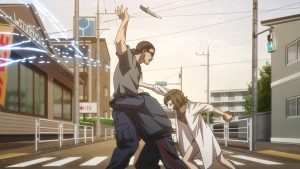 We’re a third of the way through Kokkoku now, and for me it’s firmly established as the most interesting new series of the winter in terms of premise. Where the hell did this come from? One of two things must be happening here – either the anime is much better than the manga or the manga is criminally underrated, because the manga as far as I can tell is largely unknown and hardly well-reviewed. In the end I suppose it doesn’t matter because, as I’m fond of noting, anime has to be judged on its own merits. And Kokkoku thus far is an outstanding anime.
We’re a third of the way through Kokkoku now, and for me it’s firmly established as the most interesting new series of the winter in terms of premise. Where the hell did this come from? One of two things must be happening here – either the anime is much better than the manga or the manga is criminally underrated, because the manga as far as I can tell is largely unknown and hardly well-reviewed. In the end I suppose it doesn’t matter because, as I’m fond of noting, anime has to be judged on its own merits. And Kokkoku thus far is an outstanding anime.
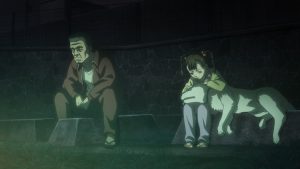 Genre and demographic of the source material are major factors in what sort of show an adaptation turns out to be, of course – not to mention medium. But one often overlooked aspect of this is that in manga vs. light novels, and then seinen and jousei vs. other demographics of manga, we see big differences in terms of exposition. This comes down to trusting your audience more than anything (though not only to that), I think – mangaka, especially seinen/jousei mangaka, know they have a little more time to reel in the audience. A complex, intricate mythology like Kokkoku could be disastrous if a series felt the need to try and explain it in an episode or two as most LN adaptations would. A little patience works wonders with this show, because the way it slowly builds its world is a thing of narrative beauty.
Genre and demographic of the source material are major factors in what sort of show an adaptation turns out to be, of course – not to mention medium. But one often overlooked aspect of this is that in manga vs. light novels, and then seinen and jousei vs. other demographics of manga, we see big differences in terms of exposition. This comes down to trusting your audience more than anything (though not only to that), I think – mangaka, especially seinen/jousei mangaka, know they have a little more time to reel in the audience. A complex, intricate mythology like Kokkoku could be disastrous if a series felt the need to try and explain it in an episode or two as most LN adaptations would. A little patience works wonders with this show, because the way it slowly builds its world is a thing of narrative beauty.
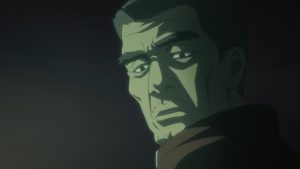 Juri is central to all this, obviously. As she’s exposed to this stasis world she slowly regains the memory of a time as a child when she was there, with her grandfather – was this memory intentionally erased, or was there a reason why she lost it for so long? It all seems to have had something to do with a pet dog, Andre, who was about to pass on. Did Juri somehow persuade her grandpa to launch stasis in order to prolong its life? That seems odd, with no desirable outcome possible – but that was the first manifestation of her ability to expel the “jellyfish”, which she almost does to Ojii-san (which causes her to appear to be moving at super speed to his eyes).
Juri is central to all this, obviously. As she’s exposed to this stasis world she slowly regains the memory of a time as a child when she was there, with her grandfather – was this memory intentionally erased, or was there a reason why she lost it for so long? It all seems to have had something to do with a pet dog, Andre, who was about to pass on. Did Juri somehow persuade her grandpa to launch stasis in order to prolong its life? That seems odd, with no desirable outcome possible – but that was the first manifestation of her ability to expel the “jellyfish”, which she almost does to Ojii-san (which causes her to appear to be moving at super speed to his eyes).
 Juri also remembers seeing Majima-san on that trip into stasis. What’s interesting here is that many of the characters here seem to know bits and pieces of how this Aegis thing works – Majima, Oji-san, Sagawa – but no one seems to know all of it. Juri confronts her grandfather with a pointed question – “why didn’t you simply destroy the stone?”. But his answer is hard to refute – how can one do such a thing and know they won’t deeply regret it later? As this is happening Sagawa-san is trying to convince Takafumi-san that the owners of the stone have a duty to use it to help people – and while this is obviously a line a bullshit meant to deceive, it’s not an invalid point. Obviously the Yuzawa haven’t been “hoarding” the power to enrich themselves (look at their lifestyle) but they don’t seem to have been philanthropic with it either.
Juri also remembers seeing Majima-san on that trip into stasis. What’s interesting here is that many of the characters here seem to know bits and pieces of how this Aegis thing works – Majima, Oji-san, Sagawa – but no one seems to know all of it. Juri confronts her grandfather with a pointed question – “why didn’t you simply destroy the stone?”. But his answer is hard to refute – how can one do such a thing and know they won’t deeply regret it later? As this is happening Sagawa-san is trying to convince Takafumi-san that the owners of the stone have a duty to use it to help people – and while this is obviously a line a bullshit meant to deceive, it’s not an invalid point. Obviously the Yuzawa haven’t been “hoarding” the power to enrich themselves (look at their lifestyle) but they don’t seem to have been philanthropic with it either.
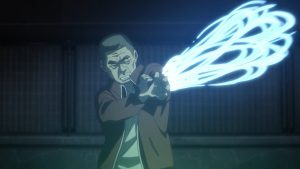 Wow, this is fascinating stuff. I love Majima’s analogy that the Sagawa’s servant stone is like “a freight car without an engine” – it can be pulled along as long as it’s hitched to the locomotive, but can’t move on its own. Another fascinating moment comes when a Herald (a much smaller one) turns up when one of the goons is about to kill a Stalled, and “dies” when its energy is used up. Majima has seen this before – a person is at the core of this Herald, apparently a former human who became an inhabitant of stasis – and she seems to be looking for someone from her family who became a Herald themselves. Is that what happens to any human stuck in stasis for too long? Is it a choice? And does the True Love Society’s “One Herald” doctrine reflect an inaccurate knowledge of the rules, or a deliberate deception?
Wow, this is fascinating stuff. I love Majima’s analogy that the Sagawa’s servant stone is like “a freight car without an engine” – it can be pulled along as long as it’s hitched to the locomotive, but can’t move on its own. Another fascinating moment comes when a Herald (a much smaller one) turns up when one of the goons is about to kill a Stalled, and “dies” when its energy is used up. Majima has seen this before – a person is at the core of this Herald, apparently a former human who became an inhabitant of stasis – and she seems to be looking for someone from her family who became a Herald themselves. Is that what happens to any human stuck in stasis for too long? Is it a choice? And does the True Love Society’s “One Herald” doctrine reflect an inaccurate knowledge of the rules, or a deliberate deception?
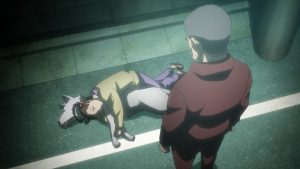 I love shows that ask questions like that – and that don’t rush to answer them before we have a chance to put the pieces together ourselves. And I love the little stylistic touches scattered throughout Kokkoku, like the depiction of how water (and tea) behaves in stasis, and Makoto-kun’s concern for helping his stalled mother pick up a stack of fallen tomato cans. Confident, assured storytelling and a smart and compelling premise are a pretty damn good pair of building blocks for an excellent anime – and this series is a very hopeful indicator of what Geno Studio might be capable of in the future.
I love shows that ask questions like that – and that don’t rush to answer them before we have a chance to put the pieces together ourselves. And I love the little stylistic touches scattered throughout Kokkoku, like the depiction of how water (and tea) behaves in stasis, and Makoto-kun’s concern for helping his stalled mother pick up a stack of fallen tomato cans. Confident, assured storytelling and a smart and compelling premise are a pretty damn good pair of building blocks for an excellent anime – and this series is a very hopeful indicator of what Geno Studio might be capable of in the future.


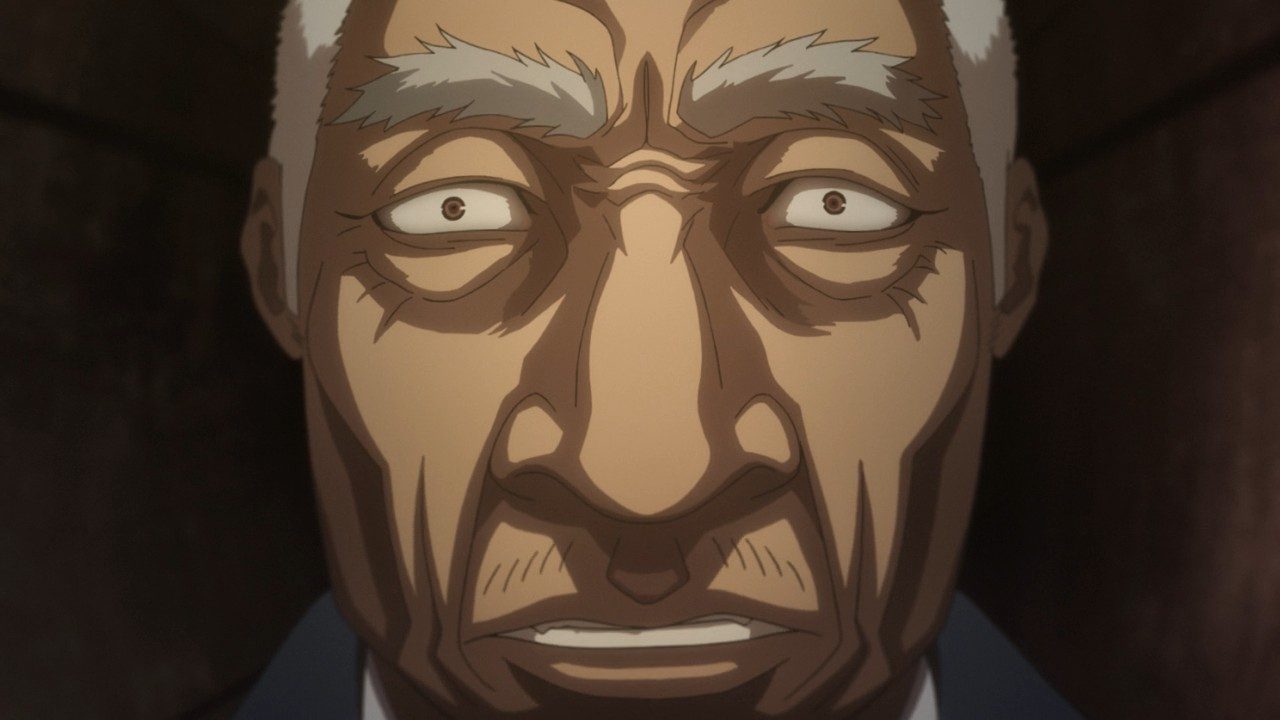
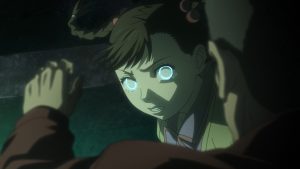
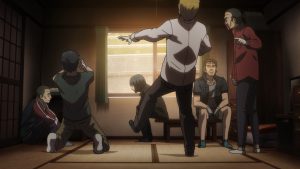
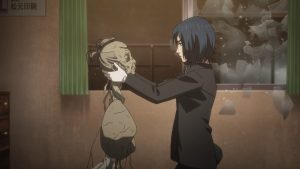

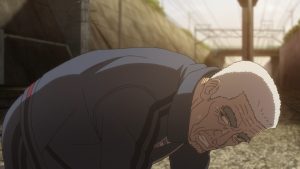
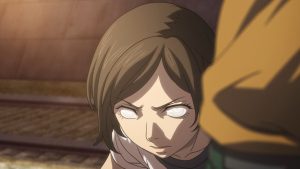
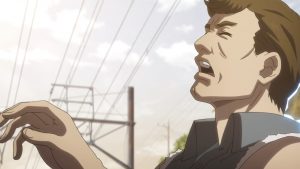
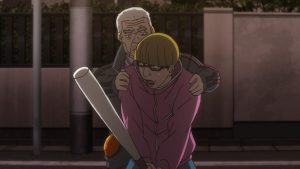
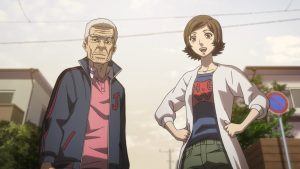
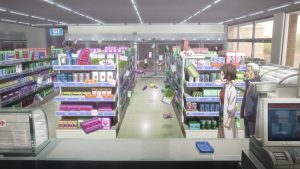
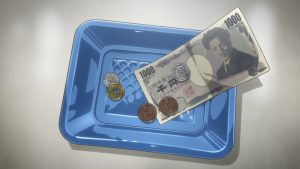
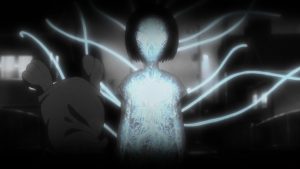
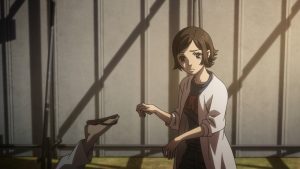
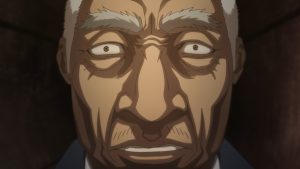
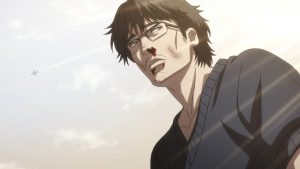
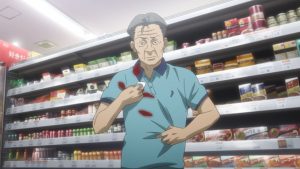
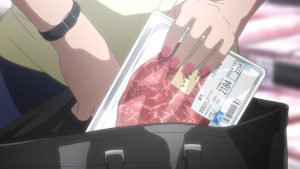
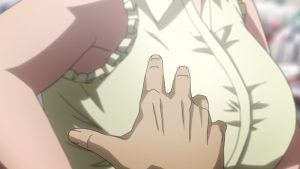
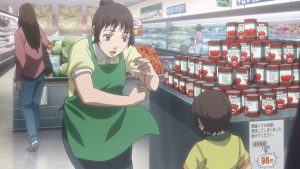
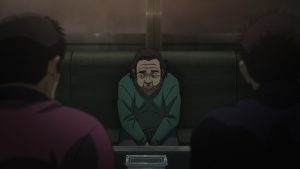
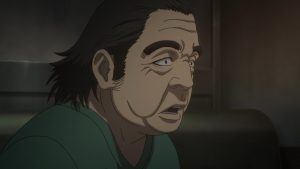
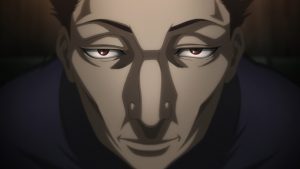
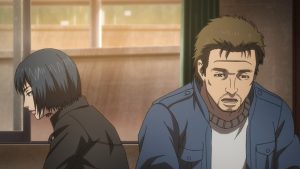
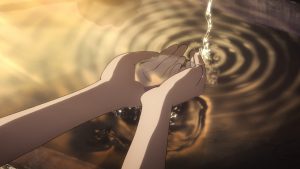
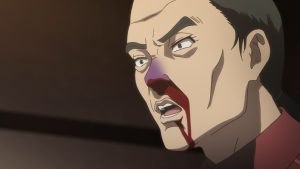
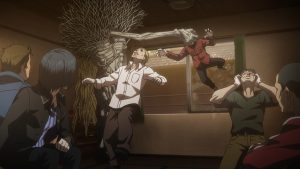
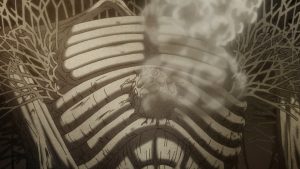

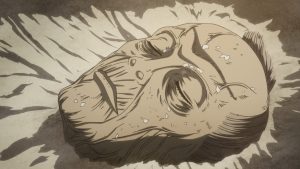
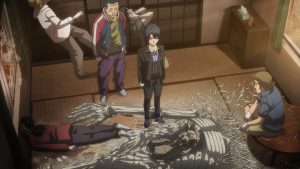


DP
January 28, 2018 at 10:33 pmI’m confused. What exactly about this show is it that you like? That it’s asking questions about its own confusing plot development and character motives?
I guess I’m missing something, but while it appeared promising at the start, right now Kokkoku just seems like the worst kind of muddled science fiction story, endlessly explaining things rather than allowing us to actually engage with the characters or story. Frankly, I’m not at all surprised to learn that the manga isn’t particularly well-known or well-reviewed, because the anime just isn’t very good, at least not at this point.
Guardian Enzo
January 28, 2018 at 11:20 pmI don’t find it muddled at all. Rather, I think it’s quite coherent and meticulously plotted. And the characterizations are quite realistic, especially within the Yuzawa family. But to each their own.
UndeadCalamari
January 30, 2018 at 8:51 amI don’t think I can say that I love this show, or even that I like it a lot, but I’m enjoying it nonetheless and find the premise interesting and refreshing. And the anime is doing a good enough job to keep me coming back to see what happens next. There really is a lot going on here and the show seems content and confident to not rush anything. Hopefully it can keep up the good quality cause it’s a bit rare to get good sci-fi in any medium.